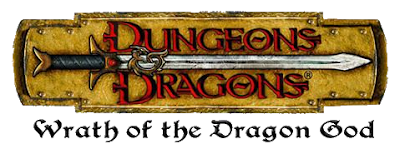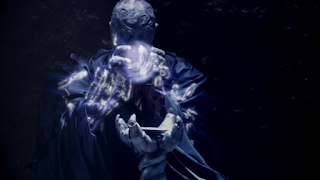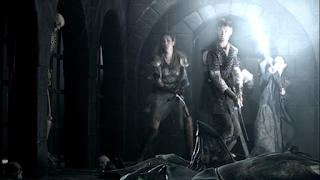Dungeons and Dragons: Wrath of the Dragon God, or The Elemental Might in some regions, is a 2005 American film loosely based on the Greyhawk setting of the role-playing game of the same name - specifically third edition. It is a made-for-TV sequel to the 2000 film Dungeons & Dragons, and set approximately 100 years after the first film's conclusion. Wrath of the Dragon God had about a fourth of the 2000 film's budget (approximately 12 million), half of which was spent just on the special effects. The movie further cut costs by hiring a cast of relative newcomers (with a few exceptions). And while the much maligned 2000 movie managed to make back roughly 74% of its production cost, Wrath of the Dragon God only made back around 2%.
Brian Rudnick and Robert Kimmel (writers) stated in an interview that they only had the rights to produce a sequel set in the same world as the 2000 movie, otherwise they would have considered other settings, most notably the Forgotten Realms. At some point in development the decision was made to change the plot, but at that point they were in too deep to completely break away from the previous film's storyline. Any changes they made also had to be run past Wizards of the Coast, who would send back notes such as: "loose the blue lipstick" and "loose the chain mail bikini". Instructions from Wizards not to use nails because the world didn't have any also impacted some of the sets, such as the makeshift raft scene.
Spoiler Warning: I am going to give a synopsis and my opinions at the very end.
Synopsis:
Set one hundred years after the first film, Damodar is revealed to be alive and well, having been cursed by his former master, Profion, with undeath. With the aid of two Dark Talon lizardfolk, he locates the Orb of Faluzure - an ancient artifact linked to the dragon god Faluzure, who lies imprisoned under the Saragasso Mountains. Damodar uses the orb to lift the curse on himself, and still bitter about his defeat to Ridley Freeborn one hundred years ago, prepares to awaken the dragon god in order to destroy the kingdom of Izmir and seek vengeance on the descendants of those who defeated him (which is never brought up again).
Damodar (sadly) no longer rocks the blue lipstick. He also stole some of Melora's hair through the Orb... however that works.
Meanwhile, a Lord Berek, bored with talk of taxes and new sewer systems, enters into a friendly duel with Valerious, one of his former students from back when he was captain of the king's guard. Lord Berek wins the fight, but later discovers Valerious let him win the match. The implication that he give up sword-fighting for good to focus on his desk work greatly dismays Berek.
Berek is one of the few characters in the film to be given something resembling a personal arc. Its established he doesn't enjoy his ministerial duties and prides himself on his past work as a captain of the guard. The blow to Berek's ego brought on by his loss to a former student beautifully establishes Berek's reservations about his abilities and self-worth. However, after his duel with Valerious, Berek never doubts himself again. We never even get another scene with Valerious outside of a few cameo shots. A shame too, because I detected more chemistry between Valerious and Berek than I did between Berek and Melora (his wife). And this is unfortunately just the start of a trend in the film where the writers appear to be setting up an arc, only for it to never go anywhere.
"You will always be my captain and I will never forget what you have taught me... especially this last lesson. Recognize when it is time to sheath your sword for good." -Valerious
Later that night Berek's wife Melora explains the differences between arcane and divine magic, claiming that no one in Izmir can use divine. If she could learn it, a seat on the all-male Council of Mages would be guaranteed. The two are interrupted by a petitioner, warning of poison gas emanating from the Saragasso caves. Upon investigating the cave the duo discover a slumbering black dragon.
Is Berek trying to wake the dragon up? He hardly reacts to it or the corpses strewn about the room.
Melora locates records in Izmir's library of Faluzure's imprisonment three thousand years ago and learns the dragon was put into stasis by an ancient civilization called the "Turanians", using the Orb. Without anyone to guard the Orb, they fear someone may have taken it, allowing the beast to stir. Melora reports her findings to Oberon, the head of the Mages' Council, and while trying to locate the Orb using a vision spell, is cursed with undeath by Damodar.
The King summons Berek to lead four of Izmir's greatest heroes to infiltrate Damodar's lair: Dorian (human Cleric of Obad-Hai), Lux (human barbarian), Nim (human thief), and Ormaline (elven wizard). However, they do not know the whereabouts of Damodar, so Berek suggests they locate the vault of Malek, a warlock worshiper of the demon Juiblex who was gifted a magical scrying pool - the Pool of Sight. Berek believes the pool will reveal Damodar's lair and the orb's location. Meanwhile, Oberon and the other mages try to find a way to defeat the dragon god.
Left: Nim (cunning), Dorian (wisdom), Ormaline (intelligence), Lux (strength), and Berek (charismatic leader). Right: Melora tries to help the council with their research by summoning a magmin (fire elemental) in the library.
While traveling through the Heart Shorn Forest, Berek's party is attacked by Klaxx the Maligned, a lich in the service of Damodar. The group flees to a raft they had built earlier and sail across the Mudwash River to the Juiblex-worshipping goblin village of Kurtl on the other side. Finding the place deserted, they ransack the chief's hut. Ormaline detects magic and Nim disarms the traps. In a locked chest they open with the stomach acid of a purple worm, lies a book containing all the information they sought.
Where did all the goblins go? No blood, no bodies, and everything left in its place?
A white dragon arrives suddenly and without warning. Dorian, the only person to confront the beast while everyone else hid, is devoured. His death spurs the others to action and within seconds the dragon is blown to bits. Back in Izmir the council uncovers a hidden chamber built by the Turanians. Klaxx also infiltrates the castle and uses his shapeshifting abilities to kill Oberon in his bath and then assumes Oberon's form.
Dorian's death gets more screentime than Dorian ever did in life. What was a white dragon - an arctic creature - doing in the middle of a forest anyway?
Nim uses a 'Gem of True Seeing' he pulled out of a skull in the woods (must have rolled high on perception) to locate the hidden marker to Malek's vault. Recalling the 'Shrine of Kuo-Toa', Lux suggests they enter a password to gain access to the vault. Lux and Ormaline hold off an army of bandits that arrives suddenly and without warning, while Nim and Berek attempt to solve the puzzle. By noticing a misspelling in Malek's name on themarker they are able to deduce the password: Juiblex. Inside the vault the team battles darkmantles and solves a dangerous mirror puzzle to secure their way to the Pool of Sight.
The Pool reveals Damodar's castle, allowing Ormaline to teleport the party there instantly. They chop off Damodar's arm, take the orb, and then teleport to the Temple of Obad-Hai all within a matter of seconds. The clerics of the temple treat a wounded Nim and Ormaline, while Berek rides back to Izmir with the orb. Lux elects to stay behind to delay the demons (gargoyles?) summoned by Damodar.
When Berek returns to Izmir with the Orb, Melora uses it to unlock the concealed Turanian chamber. Klaxx then reveals himself and kills the king, the council, Valerious, and many of the castle's other inhabitants before stealing back the Orb. Damodar (with arm re-grown) uses the orb to awaken the dragon god. Falazure destroys the Orb to regain his power and permits Damodar to witness the city's destruction. Falazure further allows Damodar to rule over the city's remains as his thrall, but demands tribute in the form of 100 human sacrifices every new moon to honor his release.
The black dragon god (dracolich?) razes Izmir to the ground with fireballs.
Melora (near death), suggests praying to the nature god Obad-Hai. As a reward for her (rather sudden) faith, Obad-Hai gifts Melora a new Orb, which she uses to seal away the dragon god once more. Berek and Lux meet up and chase the now fleeing Damodar into a field, where they force him to remove the curse on Melora.
Izmir is eventually rebuilt and Melora appointed as the new head of the Council of Mages. Berek immerses himself in his ministerial duties, while Lux, Ormaline and Nim return to adventuring. Damodar is imprisoned in a dungeon beneath Izmir; continuing to plot his revenge.
I prefer the blue-lipped henchman that was tossed off of a tower over the sad-looking man in a jail cell.
Final Thoughts
Wrath of the Dragon God has everything you would expect from a made-for-TV movie: obviously fake weapons, bad CGI, erratic camera movement during combat sequences, and so on. But it honestly doesn't look that much worse than the 2000 movie. However, the colors have been muted significantly compared to its predecessor and everything is much more grounded in reality; far less fantastical in design. Likewise, Izmir no longer has that grand, high-fantasy aesthetic. Instead looking like something from the real-world medieval period. There is also less racial diversity than the 2000 movie, both among the in-movie characters and among the real-world cast. One thing Wrath of the Dragon God does have over its 2000 predecessor, however, are the plentiful references to items, monsters, gods, spells, and modules from the tabletop source material.
While D&D fans will no doubt appreciate the increased loyalty to the source material, everything else in the movie leaves much to be desired. The story taken on its own is a run of the mill affair where you're never in doubt the good guys will win and the bad guys will loose. There's just no sense of dread, excitement, or actual adventure. The characters are all stock archetypes that aren't given any backstory, long-term goals, relationships, or personality beyond the surface level. There are moments when it feels like the writers are setting up dynamics between Nim and Lux, Berek and Nim, and Berek and Dorian, but then those characters are removed from the story before those relationships have a chance to go anywhere. I suspect something may have happened during editing or production that would explain all the abruptly cut character threads and out-of-place
dialogue. A scene near the end of the film where Berek tries to snap Lux out of a rage by telling her not to become "like her brother" really caught me off guard. Since when did Lux have a brother? What did her brother do and how does Berek know about it? (apparently it was mentioned and I just failed to notice because it was dropped casually in a conversation) I get the feeling some really important scenes were left on the cutting room floor. This may also explain why there are so many random "stuff just happens" moments in the plot, like the white dragon attack and the bandit army out of nowhere.
Worth a watch only if you're a huge D&D fan curious about the movies. Dry performances from a cast of relative newcomers and a straightforward B-movie script that takes itself way too seriously make this a hard sell to anyone but fans of the source material.
Have you seen Dungeons & Dragons: Wrath of the Dragon God? What were your thoughts on the movie? If you haven't seen it, do you plan to?
Related Reviews:


































No comments:
Post a Comment